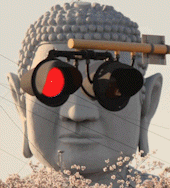This link might die so here's the whole thing
Star Telegram: There's a move afoot to shed shoes indoors
"Welcome to our home. Please remove your shoes." It's an increasingly common refrain in this age of white carpet and anti-bacterial everything, as more and more people are going shoeless at home and asking visitors to do the same. When Kari Branch's son began crawling, she says it seemed prudent to keep the floors clean by removing shoes and keeping the dogs outside. "Kids change everything," says Branch. "Now we do it mainly because we have very light-colored carpet. It's a light beige, and we don't want to make dirt paths." She has a pair of Ugg slippers that do not leave the house. "Outdoor" shoes are left in a closet in the carport, except for expensive pairs, which get carried inside.
Her son is now 6, and Branch says his friends all know to take their shoes off when they visit. "Kids are totally accustomed to it these days. Nobody ever looks at me funny." Exceptions are made for first-time guests, for people visiting on business and for Branch's diabetic father, who wears therapeutic shoes. "It's not a hard-and-fast rule," she says. "I had a mattress delivered last night, and I certainly didn't ask the delivery guys to take off their shoes. I'd probably rather they wear their shoes."
Stephanie Johnson, who has a 2-year old son, says the practice is so common among her friends and neighbors that it requires no discussion. "Nobody asks. We just do it on our own. Especially with little kids in the house, we just do it out of respect," she says. But Johnson believes it is rude to be too insistent. She says a friend recently printed her anti-shoe stance on birthday party invitations, and Johnson thought that crossed a line. Some in the shoeless camp have posted signs in their entryways to remind guests to doff their shoes. Many provide shelves or cubbyholes for shoe docking, and some go even further, providing a selection of slippers for guests to wear inside.
To the uninitiated, the practice might seem excessively demanding or simply odd. But a vast swath of the Eastern Hemisphere is covered in societies where shoe removal is the rule. "In East Asia, you sit on the floor, sleep on the floor and eat on the floor, so they are very sensitive about dirt on the floor. Even if you eat off a table, it's only about a foot high," says Gordon Berger, a Japan scholar and director of east Asian studies at the University of Southern California. "Since so much of life goes on on the floor, it stands to reason you wouldn't want the dirt from outside tracked through the house."
Some Eastern religions, including Islam and forms of Buddhism, mandate praying on the ground, sometimes bowing to touch the forehead to the floor. "In Korea there are even floors that have heating underneath them, so you would warm yourself on that part of the floor, called the ondol, and that space you'd clearly want to keep clear of dirt," Berger says.
"Japanese society very sharply distinguishes between the inside and outside, those who are part of one's inner life and those who are not," and the way you speak and conduct yourself for those two groups of people is very different, he says. Houses have rooms strictly for family and special guests, and those spaces traditionally have straw matting that would be destroyed if dirt were ground in. Going shoeless not only preserves the straw, it is a further delineation of the family realm versus the public realm in Japan, Berger says.
In addition to the Near and Far East, in much of central and northern Europe shoe removal is the norm. "When I've lived in Germany on several occasions, it was typical that one would remove street shoes upon entering the house," says professor Jeffrey Smith, a northern Europe scholar and art history professor at the University of Texas. "One then put on house shoes, if it was your own house. This practice is quite old. And my Dutch friends today usually remove their shoes upon entering the house or apartment."
For most of history, streets in Europe were not paved, and waste was dumped in the street, so public spaces were truly filthy. "In Holland in particular, the idea that cleanliness was next to godliness was pounded into heads in the 17th century. Keeping a clean house was a sign of devoutness. But it's also a practical thing, certainly in areas where it snows. My sister in Canada has a whole room where they take off their shoes," Smith says.
In the United States, the practice appears to be more prevalent in the upper half of the country, where there is more precipitation and therefore more mud. Last month, The New Yorker magazine ran a nine-page profile of a Czech shoe expert that raised the question of why we wear shoes at all. The feet of Homo sapiens are magnificent machines, after all, and most foot ailments are the result of the ill-fitting shoes we wear to conceal and distort what are illogically viewed as vulgar and unattractive appendages.
As more people decide that shoes are dirty and need to stay by the door, there might be an increasingly disgruntled group of people who think feet are gross and need to stay out of sight. But the culture of foot embarrassment is fading. For example, we're now accustomed to shedding our shoes in airports. And The Wall Street Journal has declared that flip-flops can be office-appropriate.
House cleaner Jackie Perez not only keeps shoes out of her home, she's a big advocate who has recruited some converts. "I just visited two gentlemen whose house I used to clean before they moved. I had told them if they took their shoes off, their house would stay cleaner, and now they're doing it, and they're amazed by the difference. So it's rubbing off. If I can change one client at a time . . . it's for their sake and for their kids'," she says.
Perez says her mother's place in Florida has been shoe-free for about a year, during which her health has improved. "She has less allergies because she has less dust." When she was a real estate agent, Perez became frustrated when people tracked dirt through a home just before an open house. So when she started her cleaning business, she decided to try a shoeless policy at home, and became a believer. She used to sweep and dust every day; now just every three days.
| Hot Topics | |
|---|---|
"Welcome to our home. Please remove your shoes."
15 posts
• Page 1 of 1
-

Mulboyne - Posts: 18608
- Joined: Thu May 06, 2004 1:39 pm
- Location: London
We did the take off shoe thing at home too when I was growing up.
But then I come from a family of obsessive-compulsives...
But then I come from a family of obsessive-compulsives...
gomichild's ramblings - Cerebral Soup | flickr | Womb Quake
-

gomichild - Posts: 2371
- Joined: Tue May 28, 2002 1:23 am
- Location: FNQ
gomichild wrote:We did the take off shoe thing at home too when I was growing up.
But then I come from a family of obsessive-compulsives...
What, the whole family lining up to wash their hands, each wih their own bar of soap?
One is tempted to define man as a rational animal who always loses his temper when he is called upon to act in accordance with the dictates of reason. - Oscar Wilde
-

Ketou - Maezumo
- Posts: 1383
- Joined: Fri Jun 21, 2002 11:31 am
hehehe almost - except for my little brother who was a throwback...
gomichild's ramblings - Cerebral Soup | flickr | Womb Quake
-

gomichild - Posts: 2371
- Joined: Tue May 28, 2002 1:23 am
- Location: FNQ
gomichild wrote:We did the take off shoe thing at home too when I was growing up.
But then I come from a family of obsessive-compulsives...
Are we talking Matchstick Men compulsive?
-

Big Booger - Posts: 4150
- Joined: Sat Jan 11, 2003 8:56 am
- Location: A giant bugger hole
Towels were a big issue in my household. It was almost as if by using another persons towel you would catch the plague. We all had different coloured towels so that there would be no confusion....
gomichild's ramblings - Cerebral Soup | flickr | Womb Quake
-

gomichild - Posts: 2371
- Joined: Tue May 28, 2002 1:23 am
- Location: FNQ
gomichild wrote:We did the take off shoe thing at home too when I was growing up.
But then I come from a family of obsessive-compulsives...
We also took off our shoes at home; my Mom was a neat-freak.
YBF is as ageless as time itself.--Cranky Bastard, 7/23/08
FG is my WaiWai--baka tono 6/26/08
There is no such category as "low" when classifying your basic Asian Beaver. There is only excellent and magnifico!--Greji, 1/7/06
FG is my WaiWai--baka tono 6/26/08
There is no such category as "low" when classifying your basic Asian Beaver. There is only excellent and magnifico!--Greji, 1/7/06
-

kamome - Posts: 5558
- Joined: Tue Apr 02, 2002 11:50 am
- Location: "Riding the hardhat into tuna town"
anyone see the episode of sex and the city when carrie had to take er shoes off??? hahah that was classic.
I dont know of anyone who does it here in NZ - but i guess we are all savages at the ass end of the world
I dont know of anyone who does it here in NZ - but i guess we are all savages at the ass end of the world
-

ichigo partygirl - Posts: 1521
- Joined: Sun Jan 16, 2005 5:35 pm
- Location: Sydney, Australia
Re: "Welcome to our home. Please remove your shoes.&quo
Ahhh, the sweet Japanese custom of, "Please-remove-your-shoes.
Shoe removal also is common in Russia, but somehow hosts wise up enough not to ask a person on crutches to remove their shoes since that is akin to asking a ablebodied person to remove their legs. Needless to say, coping with a severely broken leg like mine at the moment is fun in Japan.
Shoe removal also is common in Russia, but somehow hosts wise up enough not to ask a person on crutches to remove their shoes since that is akin to asking a ablebodied person to remove their legs. Needless to say, coping with a severely broken leg like mine at the moment is fun in Japan.
_________
FUCK THE 2020 OLYMPICS!
FUCK THE 2020 OLYMPICS!
-

Taro Toporific - Posts: 10021532
- Images: 0
- Joined: Tue Sep 10, 2002 2:02 pm
Back in Canada, all of my friends families', my family, and everyone I know -ALWAYS- removed their shoes and left them at the entrace. I can't imagine someone walking into my home wearinng their grubby shoes from outside, god only knows that people have stepped in/on.
-

aquamarine - Maezumo
- Posts: 495
- Joined: Sat Jun 05, 2004 4:53 pm
- Location: Northern Tokyo
Re: "Welcome to our home. Please remove your shoes.&
Taro Toporific wrote:Ahhh, the sweet Japanese custom of, "Please-remove-your-shoes.
Shoe removal also is common in Russia, but somehow hosts wise up enough not to ask a person on crutches to remove their shoes since that is akin to asking a ablebodied person to remove their legs. Needless to say, coping with a severely broken leg like mine at the moment is fun in Japan.
yeah thats gotta suck. when i had broken leg i had a hard enough time using crutches and using stairs, let alone having to take off shoes. may be u need some crutch baggie slipers for inside
-

ichigo partygirl - Posts: 1521
- Joined: Sun Jan 16, 2005 5:35 pm
- Location: Sydney, Australia
Here in the Socialist Fantasy Land of Sweden, (where the handouts never end, and the safety net never tears) people ALWAYS remove their shoes as soon as they enter a house (their's or sombody elses). Typically, there is a shoe rack located inside of the doorway - inside, because if left outside they would get snow, ice, or rain in them.
It is a PITA, but I have to say, the house stays a lot cleaner because of it.
Some anal people (possibly afraid that others in the room might have a foot fetish) walk around with a bag that contains house shoes - shoes that are never worn outside so they can be safely worn in the house they are visiting.
fast_dave
It is a PITA, but I have to say, the house stays a lot cleaner because of it.
Some anal people (possibly afraid that others in the room might have a foot fetish) walk around with a bag that contains house shoes - shoes that are never worn outside so they can be safely worn in the house they are visiting.
fast_dave
- fast_dave
- Maezumo
- Posts: 25
- Joined: Sun Feb 08, 2004 11:04 pm
Mrs. Omae Mona expressed shock at the inconsistency in the U.S. when it comes to this issue and babies. We're more fanatic about sterilizing baby items back home than in Japan. But when she found out that we then let babies crawl around on the floor after coming inside with our shoes, she pointed out "but there's dog shit on the floor!".
-

omae mona - Posts: 3184
- Joined: Mon Aug 18, 2003 12:08 pm
i dont take off my shoes before getting in my home in London. None of my family or friends do either (except my friends from Hong Kong & Korea), but when I own my own home, Im definately taking up the 'no-shoes inside' rule!! London has to be one of the dirtiest places in the world! On the floor there are dead rats, rubbish, sick, dog poo, god knows what! As most homes in UK have carpets too, imagine what kind of stuff is lurking between the carpet wool??
Should get a microscope out, should be interesting..! >_<
Should get a microscope out, should be interesting..! >_<
- karekora
- Maezumo
- Posts: 145
- Joined: Sat May 22, 2004 4:43 am
15 posts
• Page 1 of 1
Who is online
Users browsing this forum: No registered users and 3 guests

